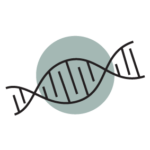Sample Required: Blood | Test Type: Genetic
Key Advantages
DNA Hormones is a comprehensive nutrigenetic test analysing and reporting on metabolism and detoxification of sex hormones.
The DNA Hormones test analyses and reports on gene variants that have been shown to have an impact on sex steroid metabolism and biotransformation, affecting male and female health. DNA Hormones is an upgrade of the DNA Oestrogen test.
The report offers personalised diet, lifestyle and hormone interventions to support optimal hormonal health and resilience.
Research has shown that hormonal imbalances can occur due to an increased lifetime exposure to an unsuitable environment (e.g. high oestrogen exposure, increased BMI, carcinogens, sedentary behaviour). This, together with an intrinsic imbalance, due to genetic variation, is a strong risk factor for the development of various hormone-related conditions, affecting both men and women.
Depending on the stage in an individual’s lifecycle, environmental exposures and genetic variants carried, certain hormonal biosynthesis, degradation and biotransformation pathways might be preferred. This increases risk for altered sex hormone metabolite ratios as well as imbalance in redox status.
These alterations have been linked to predisposition for hormone related disorders including:
The test should be considered for those who are suffering from, or have a family history of any hormone related disorder, or who are experiencing symptoms that might be related to imbalanced hormone metabolism. It is also beneficial for anyone taking/considering hormone therapy (contraceptive or replacement therapy) for insights into potential clotting risk and to ensure detoxification pathways are optimally supported.
If you are interested in incorporating this test into your practice please contact us for more information.